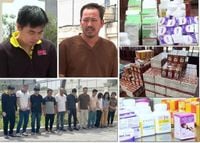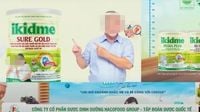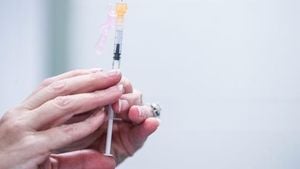In recent months, authorities in Vietnam have been cracking down on a disturbing trend involving the production and distribution of counterfeit milk and medicine. This alarming issue has raised serious concerns about consumer safety and the integrity of food and health products in the country.
One poignant case is that of a woman named N.H. from Bac Ninh, who has unwittingly purchased 80 boxes of milk over the last four years, all of which have been identified as part of a massive counterfeit operation. "At first, they advised me to use imported goat milk because it was supposed to be good for my baby. Then, in 2024, they recommended switching to Talacmum milk, which was also later revealed to be fake," N.H. recounted, expressing her regret for not investigating the products more thoroughly.
As of now, N.H. still has 23 boxes of this fake milk left, and she reflects on her decision with deep remorse. "I feel guilty for trusting the sellers and not doing enough research on the products I bought. My family’s health is at stake, and I can’t get back the time lost due to this negligence," she lamented.
Another consumer, H.V. from Thai Binh, shared her experience of purchasing height-increasing milk for her daughter. After realizing the product was counterfeit, she has been in a state of distress, feeling both anger towards the sellers and disappointment in herself. "I spent over 600,000 VND on a box of milk, thinking it was high quality because it was expensive. Now, if anything happens to my child’s health, I will regret it immensely," H.V. said.
Reports reveal that many consumers are now questioning the authenticity of the milk products they use. A woman named Diep Hoang from Hanoi felt fortunate that she avoided buying a 'strange' milk that was prescribed by her doctor. "The doctor advised me to buy it from a pharmacy, but I didn’t trust the brand since it wasn’t well-known," she explained.
Similarly, Lê Nga from Thanh Hóa was also prescribed a lesser-known milk for her child but decided against purchasing it after doing some research. "Now, after the counterfeit milk scandal, I checked the company’s website and found that product is no longer available. It’s quite concerning," Lê Nga remarked.
These counterfeit products, often referred to as "grass milk" by consumers, are flooding the market through various channels. Lê Vy from Quang Ninh has been actively seeking accountability from a store in Uông Bí where she purchased fake milk nearly two years ago. "They cannot escape responsibility. Many celebrities have endorsed these products, which made us trust them. They even had promotions where you could win gold for buying milk," Lê Vy expressed her frustration.
In light of these events, many consumers are vowing to change their purchasing habits. "I won’t trust advertisements anymore. I will do my own research instead of relying on sales pitches," one consumer stated.
The Ministry of Public Security's Investigation Police Agency reported that the counterfeit milk production and distribution operation was responsible for creating 573 different brands of milk powder. These products were marketed to vulnerable groups, including individuals with diabetes, kidney failure, premature infants, and pregnant women. Alarmingly, the actual ingredients of these counterfeit products often did not match the labels, as they contained none of the advertised components such as bird's nest extract or cordyceps.
Authorities have confirmed that the quality of some of these milk products fell below 70% of what was claimed on the packaging, qualifying them as counterfeit. This revelation has prompted widespread concern among consumers who had previously trusted these products.
In a related crackdown, police in Thanh Hóa recently dismantled a large-scale operation producing fake medicines, arresting 14 individuals involved in the scheme. The authorities seized 21 types of counterfeit Western medicine and joint treatment drugs across six locations in major cities, including Hanoi and Ho Chi Minh City. Nearly 10 tons of fake medicine and raw materials were confiscated during the operation.
One affected individual, Nguyễn Văn Dũng from Tay Hồ, Hanoi, expressed his dismay after discovering that the milk he had been consuming from reputable companies, such as Rance Pharma and Hacofood Group, had quality indices below the claimed levels. "I was relying on these products for my diabetes and joint issues, and now I’m worried about the impact on my health," he shared.
According to Article 194 of the 2015 Penal Code, those found guilty of producing and trading counterfeit medicines can face imprisonment from two to seven years. In cases where the crime is committed with organization or professional intent, sentences can rise to between five and twelve years. The penalties for producing and distributing counterfeit food products can be even more severe, with offenders facing life imprisonment.
Legal experts, such as lawyer Lê Hồng Vân from the Hanoi Bar Association, have emphasized the dangers of counterfeit medicines and food products. "Using fake medicines can prevent patients from receiving proper treatment and may increase toxicity in the body. For counterfeit food, consumers risk food poisoning, allergies, or chronic health issues due to exposure to harmful substances," Vân explained.
As the authorities continue to crack down on these counterfeit operations, the public remains vigilant, realizing the importance of verifying the authenticity of the products they consume. The recent scandals have sparked a broader conversation about consumer awareness and the need for stricter regulations in the market to protect public health.





